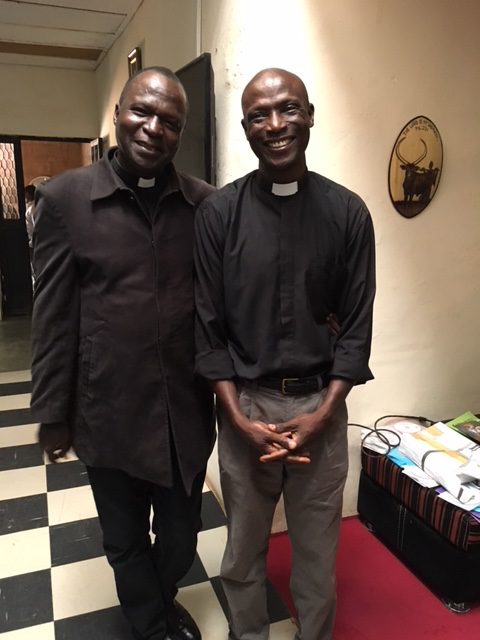 Nigeria is the epicenter of the new Christianity of the Global South. More Anglicans gather for worship in Nigeria on an average Sunday morning than in all the Episcopal and Anglican churches in North American and Great Britain combined.
Nigeria is the epicenter of the new Christianity of the Global South. More Anglicans gather for worship in Nigeria on an average Sunday morning than in all the Episcopal and Anglican churches in North American and Great Britain combined.
At the same time that Christian revival keeps bubbling in Nigeria, Christians in Nigeria are being slaughtered by Muslims on jihad. Since January 2018 eight thousand Christians—most of them children, women and the elderly (according to the Egyptian scholar Raymond Ibrahim)—have been hacked by machetes or gunned down by AK-47s to the cry of “Allahu Akbar!”
I just returned from an intense nine days teaching in Jos, Nigeria, at the center of this religious cleansing. Dedicated young Christian leaders and seminarians told me they cannot sleep because the attacks always come in the middle of the night. Many know believers who have been killed. Archbishop Benjamin Kwashi’s home was attacked last week, his cows stolen, and his beloved neighbor who tried to protect him was gunned down. Most think the Archbishop’s attackers were sending a message, “You are on our list.”
The Nigerian Christians I met showed me new things about the Trinitarian God. To be sure, none of them were new intellectually. But all of them were fleshed out in new ways.
- Food is relative. Here in the United States we are more obsessed with food than in any time of our history. But in the middle belt of Nigeria most Christians live on one or one-and-a-half meals per day. In mid-morning there might be a breakfast of tea and white bread. The dinner meal is rice and beans with a vegetable or fruit. Meat is expensive and therefore rare. When I asked Joseph, a 20-something Anglican, how he can work all day without food until his only real meal at night, he lit up with a big smile: “We get used to it.” In other words, for a Christian there are more important things.
- Respect for other human beings. Daniel, a 25-year-old Catholic who worked at my hotel, was like every other Nigerian Christian I met. He bowed his head slightly when he met me in the morning, and said “Good morning, sir!” (He was no less cheerful when I woke him up at 4 AM!) The men and women whom I met greeted Nigerians and foreigners with this same respect. Women do a slight curtsy as they bow and greet others with a smile. Not all Nigerians articulate their reason for showing this profound respect for others, but the active Christians know it is deference to the image of God in their neighbors.
- Unity in the body of Christ. A singer in his mid-50s was introduced to me as “the father of Nigerian worship.” He told me that before the persecutions started in 2001, Nigerian churches felt more distrust between denominations. “Now,” he said, “there is only one church, the Nigerian Church of Jesus Christ. Sure, we are Baptists and Pentecostals and Catholics and Anglicans. But we all suffer persecution, and that has brought us together.”
- Courage.
 Rev. Mark Mukan (left) is an Anglican priest who is planting a church in a village infested with Boko Haram, the jihadist group that kills Christians. He goes into the village undercover and knows that if discovered, he will be tortured and killed. Rev. Hassan John is another Anglican priest who pastors a church but also reaches out to Muslims, helping their children get to school and university. Boko Haram has put a bounty on his head. He too often risks his life. Both Mark and Hassan are undeterred, and laugh about the risks. As Mark puts it, “I owe everything to Jesus. How can I not share Him?”
Rev. Mark Mukan (left) is an Anglican priest who is planting a church in a village infested with Boko Haram, the jihadist group that kills Christians. He goes into the village undercover and knows that if discovered, he will be tortured and killed. Rev. Hassan John is another Anglican priest who pastors a church but also reaches out to Muslims, helping their children get to school and university. Boko Haram has put a bounty on his head. He too often risks his life. Both Mark and Hassan are undeterred, and laugh about the risks. As Mark puts it, “I owe everything to Jesus. How can I not share Him?” - Passion for the gospel. Last week I had the privilege of joining a Monday morning Eucharist that Archbishop Kwashi led for the priests in his diocese. The Archbishop told the priests, “We refuse to let persecution stop our mission. If we die preaching the gospel, we die. But there is joy in sharing the Word of life. And we must continue.”
- Divine gentleness. Daniel Lars is a young priest whose wife is pregnant with their first child. He helps run the seminary outside Jos. He told me his Muslim neighbors recently moved out of their houses, and it is feared that their leaders are protecting them from an imminent attack on Christians in this neighborhood. But Daniel is gentle when he talks about Muslims, and wants them to find salvation in the love of Jesus Christ. It struck me that only divine power can give Daniel that gentleness toward his enemies.
- The gospel’s impact on society. There are subtle signs in the strangest places that the gospel has affected behavior and not just thinking. When an Anglican priest drove me through an army checkpoint, a young soldier spied the priest’s collar, smiled, and handed him two eggs. The priest blessed the soldier for what might have been a genuine sacrifice.
 As we passed trucks along the road, I noticed that most had slogans painted across their cabs. One read, “Do Good.” Another was “Go Well.” Still another: “Look, Listen and Learn.” Cynics might say these represent cheap moralism. But there is little doubt they come from the conviction that there is a God who cares how we behave.
As we passed trucks along the road, I noticed that most had slogans painted across their cabs. One read, “Do Good.” Another was “Go Well.” Still another: “Look, Listen and Learn.” Cynics might say these represent cheap moralism. But there is little doubt they come from the conviction that there is a God who cares how we behave.
Finally, last week I was told of young men raised in Christian villages who got fed up with Muslim attacks on their Christian neighbors and started attacking Muslims. They killed one man, torched two cars, and bloodied several others. But then they were filled with remorse and turned themselves in to police, who no doubt imprisoned them and perhaps tortured them. I had no way to confirm this report. But it suggested at least one thing: that Nigerian Christians believe it is wrong to attack Muslims at large when jihadist Muslims are attacking Christians.
This is another rare but profound way that the gospel changes society.










